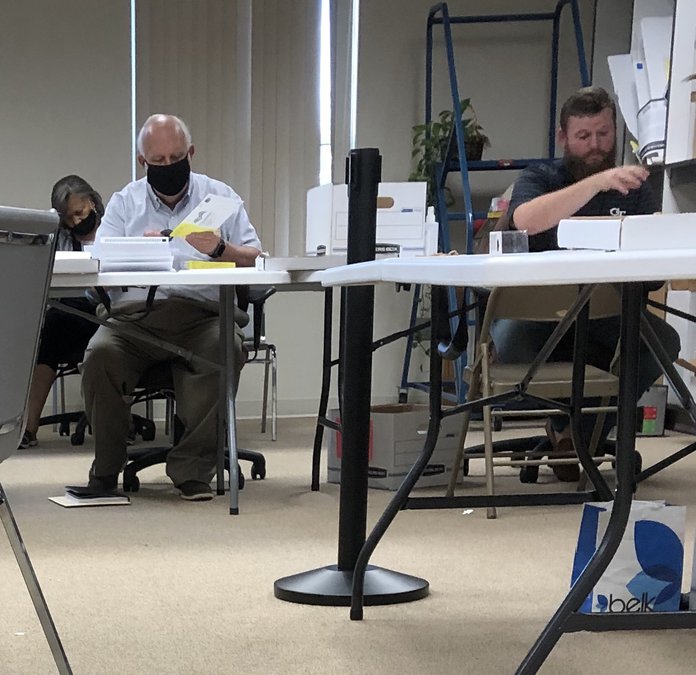COVINGTON, Ga. — “Catastrophic” is how President Donald J. Trump has described universal mail-in voting in recent weeks.
As the Nov. 3 election nears, Trump has stated his belief that mail-in ballots could lead to widespread voting fraud and could give Democratic presidential nominee Joe Biden an unfair advantage. It’s also been rumored that the U.S. Post Office won’t be able to deliver all ballots in time to be counted.
Despite growing concern, the U.S. Postal Service is prepared for an unprecedented presidential election, Postmaster General Louis DeJoy said in a statement Wednesday, Aug. 18.
“The Postal Service is ready today to handle whatever volume of election mail it receives this fall,” DeJoy said. “Even with the challenges of keeping our employees and customers safe and healthy as they operate amid a pandemic, we will deliver the nation’s election mail on time and within our well-established service standards. The American public should know that this is our number one priority between now and election day.”
DeJoy announced the postal service would be expanding its current leadership taskforce on election mail to ensure results are delivered on time.
Philip A. Johnson, chair of the Newton County Board of Elections and Registrations, said the president’s claims aren’t true.
“Georgia’s system of mail-in absentee ballots is time tested and as secure as in-person voting,” he wrote in a letter to The Covington News.
“The system is designed to safeguard against voter fraud, instances of which in history are rare to nonexistent. Having watched the system work, I have complete confidence in the process and the people who work the elections. You should too.”
More than 230 million Americans are considered eligible to vote, according to the U.S. Census Bureau, but in the 2016 presidential election, approximately 138.8 million voters cast a ballot. Approximately 24% of those were mail-in absentee ballots, according to the U.S. Election Assistance Commission.
Despite ballots cast by the millions, there have been only 954 election fraud cases across the U.S. since 1982, according to The Heritage Foundation. Thirteen cases were recorded in 2020 alone — only three cases were classified as fraudulent use of absentee ballot and/or duplicate voting.
However, since 1997, there have only been 20 election fraud cases in the state of Georgia.
There have been 10 cases of fraudulent use of absentee ballots. Only one resulted in a criminal conviction.
Tommy Raney, a 2007 candidate for the Jackson City Council, and his campaign worker, Debra Brown, pleaded guilty to mishandling more than 40 absentee ballots in the 2007 Jackson City Council race, according to the foundation. Raney had won the election by 27 votes. Both were sentenced to two years of probation. Raney was fined $158,000, and Brown was fined $20,000.
There has been only one case of duplicate voting in the state of Georgia, which came in 2010, according to the foundation. There have been three cases of false registrations (two in 2011 and one in 2015). Only one of the cases resulted in a criminal conviction (2015).
There have been no cases of altering the vote count.
Of the 16,487 votes cast in Newton County in the Aug. 11, runoff election between Jeffrey Foster and Robert Stansfield for the Alcovy Judicial Circuit Superior Court judge position, 8,308 votes (50.39%) came from absentee ballots.
Similar, if not record-breaking turnout is expected nationwide for the presidential election, Johnson said. That means absentee ballot totals could multiply exponentially.
In Georgia, voters must complete an application to get an absentee ballot. Johnson said the absentee ballot is only sent to the voter once the application signature is matched to the signature on the voter registration card on file.
When returning a ballot, the voter is required to sign an oath on the outside ballot envelope, which is matched to the voter registration card on file. Once received, Johnson said the ballots are removed from envelopes and scanned through the same ballot reader used to count in-person, election-day ballots.
“I want to assure you that the vote count in Newton County will not take weeks or months to complete and report,” Johnson said. “It is our plan to complete the count and publish it on the evening of Nov. 3.”
Besides mailing it in or voting in person Nov. 3, Newton County residents will also get three weeks of early voting.
Absentee ballots can be applied for at any time between 180 days prior to the election and the end of the business day on the Friday before the election.
But even if voters don’t apply for an absentee ballot, there’s no reason not to go to the polls to vote. Social distancing will be practiced and hand sanitizer will be available at polling places in Newton County, Johnson said. Masks will be strongly encouraged.
“If you go and wear a mask, if you observe the physical distancing and don’t have a crowded situation, there’s no reason why you shouldn’t be able to [vote],” said Dr. Anthony Fauci, director of the National Institute of Allergy and Infectious Diseases, in a recent interview with National Geographic.





